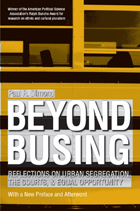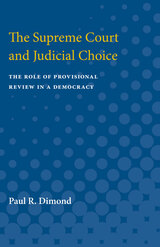2 books by Dimond, Paul R.

Beyond Busing
Reflections on Urban Segregation, the Courts, and Equal Opportunity
Paul R. Dimond
University of Michigan Press, 2005
A compelling insider's account of the fight for educational desegregation, from one of its most dedicated and outspoken heroes. A new afterword explains the author's controversial belief that the moment for litigating educational equality has passed, clear-sightedly critiquing his own courtroom strategies and the courts' responses, before closing with an assessment of the economic and social changes that he feels have already moved us "beyond busing."
"An extraordinarily informative and thoughtful book describing the process of bringing Brown [v. Board of Education] North and the impact this process had upon national attitudes toward desegregation."
--Drew S. Days III, Yale Law Journal
"An original analysis of a tough subject. A must-read for all who care about opportunity for all our children."
--Donna E. Shalala, President, University of Miami
"Paul Dimond remains a passionate and caring voice for inner-city students, whether in his advocacy of school desegregation, school choice plans, or school finance reform. He illuminates these issues as one who participated in the major education cases and as a perceptive scholar."
--Mark Yudof, Chancellor, The University of Texas System
"A must-read for anyone who wants to understand America's continued failure to give inner-city children a quality education or to do something about it!"
--Sheryll Cashin, Author of The Failures of Integration: How Race and Class Are Undermining the American Dream
"Dimond is particularly good at relating his slice of legal history to the broader developments of the 1970s, and his occasional remarks about trial tactics are amusing and instructive. Dimond's
honesty about both his successes and failures makes his book required reading for civil rights lawyers."
--Lawrence T. Gresser, Michigan Law Review
"A fascinating first-hand account of 1970s northern school desegregation decisions."
--Neal E. Devins, American Bar Foundation Research Journal
"Dimond reminds the liberal reader of the promise that lies in the empowerment of ordinary families to choose their own schools."
--John E. Coons, Professor of Law, Emeritus, University of California, Berkeley
Paul R. Dimond is counsel to Miller, Canfield, Paddock and Stone, Michigan's largest law firm; chairman of McKinley, a national commercial real estate investment and management firm; and chairman or member of the board of trustees of numerous education, community, and civic organizations. He spent four years as President Clinton's Special Assistant for Economic Policy.
[more]

The Supreme Court and Judicial Choice
The Role of Provisional Review in a Democracy
Paul R. Dimond
University of Michigan Press, 1989
The conventional wisdom holds that the Supreme Court provides the final word—as the Court tells the people what the Constitution commands. In interpreting uncertain constitutional text, however, the Court is not provided with a single answer but must, itself, make hard choices. Such choices by an unelected Court appear to conflict with the basic principle of majority rule by the people through their elected representatives in our democracy. Over time, however, through public debate, new arguments before the Court, legislation, new appointments to the Court, and constitutional amendments, the Court's prior judgments evolve, are distinguished or modified, and are even directly overturned. Viewed from this longer term perspective, the Court's supposedly final rulings can therefore be seen as an integral part of an ongoing national dialogue over the meaning of the Constitution. This understanding makes judicial review more consistent with our tradition of government by the people rather than by the Court. To explore this understanding, The Supreme Court and Judicial Choice develops a provisional approach to judicial review under which a surprisingly large number of judicial rulings would be subject to modification by ordinary legislation enacted by Congress. Far from rendering the Court a powerless subject of Congress, this proposal would enhance the vital role of the Court in stimulating and shaping the ongoing dialogue with the people over the meaning of the Constitution.
[more]
READERS
Browse our collection.
PUBLISHERS
See BiblioVault's publisher services.
STUDENT SERVICES
Files for college accessibility offices.
UChicago Accessibility Resources
home | accessibility | search | about | contact us
BiblioVault ® 2001 - 2024
The University of Chicago Press









